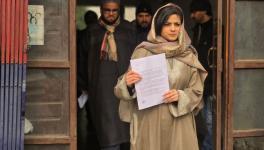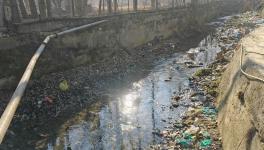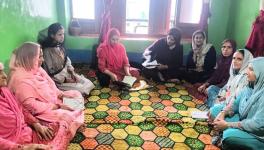Epitome of State Oppression? Kashmir Witnesses Longest Clampdown in 2019
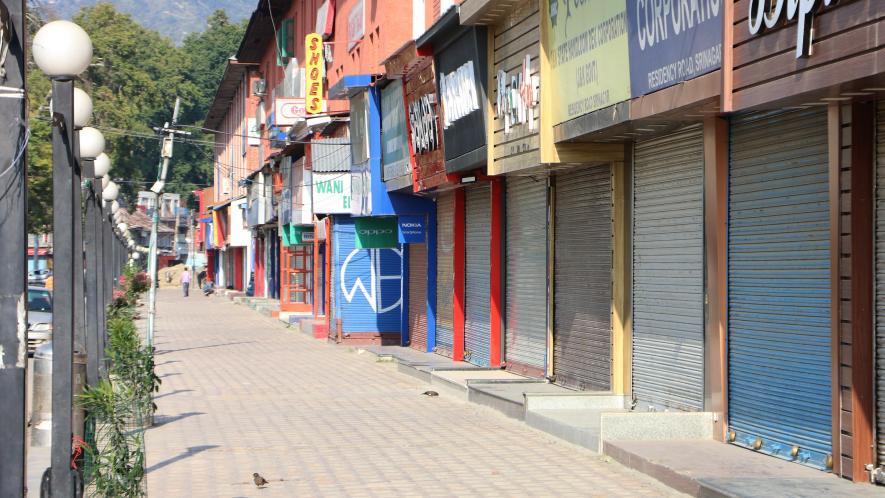
A civilian shutdown was observed by shops at city center Lal Chowk for nearly 4 months.
Srinagar: A long and severe clampdown, political onslaught, regional divide and heightened tension – for the people of Kashmir the year 2019 was the sum of all fears.
From the abrogation of Article 370 and 35 A granting special status to the erstwhile state if Jammu and Kashmir to downgrading the state by bifurcating it into two union territories, the region underwent an unprecedented transformation. The consistency in absolute ban on communication services to stopping devotees from attending various religious congregations and commemorations, the year marked, many claimed, the “epitome of uncertainty” for Kashmir.
Despite all the turbulence, however, as compared to the previous years of unrest like in 2016, there were nil incidents of civilian killings by police and security forces, and comparatively fewer incidents of injuries to pellet guns. Even though hundreds of incidents of stone pelting were reported across the region, demonstrations, protests, rallies remained largely non-violent.
Clock tower at Lal Chowk sealed on Eid ul Azha.
On August 5, the government unilaterally abrogated Article 370, a 65-year-old law that granted special status to Jammu and Kashmir and with it another guarantee-driven law, Article 35 A, revoking a decades old relation between Srinagar and New Delhi. The government as it downsized the status of Jammu and Kashmir, bifurcated the erstwhile state into two union territories, a decision taken for the first time ever in the country according to constitutional experts.
Arrests and Detentions
Hundreds of traders, businessmen, politicians, lawyers, activists and commoners were arrested, while the government termed it as part of “preventive measures” to maintain law and order. An unprecedented clampdown was enforced across the erstwhile state, the movement of people completely restricted and all communication services abruptly stopped. The clampdown resulted in a major crisis with people confined to their homes, limiting their access to essential services like healthcare. Education suffered and so did business. The Kashmir Chamber of Commerce and Industries (KCCI), a trade body, estimated economic losses running over Rs 10,000 crore for the months after August.
Also read: Continuing Internet Blockade in Kashmir Creates Another Major Crisis
On December 30, the government released five politicians from their detention since August 5. Those released included Bashir Mir of Congress, Yasir Reshi and Zahoor Mir of the People’s Democratic Party (PDP), and Ishfaq Jabbar and Ghulam Nabi Bhat of National Conference. Earlier on November 25, Dilawar Mir of the PDP and Ghulam Hassan Mir of the Democratic Party – Nationalist were released. Scores still remain under arrest at the Srinagar’s MLA hostel, a government accommodation turned sub-jail, where two dozen senior politicians from different political parties continue to remain incarcerated. Among the detained leaders are three former chief ministers of Jammu and Kashmir – Farooq Abdullah and his son Omar Abduallah and Mehbooba Mufti. Farooq Abdullah has also been charged under the draconian Public Safety Act (PSA).
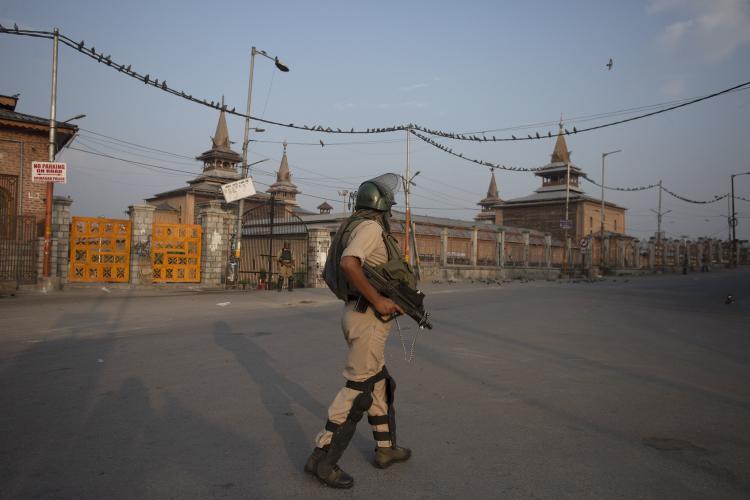
A paramilitary soldier stands guard outside the Jama Masjid in Srinagar.
NC’s Hasnain Massoodi, Member of Parliament from Anantnag constituency, had earlier told NewsClick that all political decisions have been halted until the leaders are released. “We are currently thinking and working on the issue of bringing the pre-August 5 position back,” he had said. Meanwhile, dozens of others including trade leaders like Yasin Khan and Shakeel Qalander, senior lawyers like Mian Abdul Qayoom and many other activists have been put in jail outside Kashmir.
The decision to abrogate Article 370 was preceded by banning of regional outfits like Jammu and Kashmir Liberation Front (JKLF) and socio-political organisation Jamaat-e-Islami earlier this year.
The region also witnessed one of the worst terror attacks on February 14 when an explosive-laden vehicle hit a paramilitary convoy at South Kashmir’s Pulwama district killing 40 CRPF personnel on spot. The suicide attack was carried out by a local youth recruited by Jaish-e-Mohammad outfit on the national highway.
Also read: Fear, Anxiety and Uncertainty on Faces of Bengal Migrant Workers Returning from Kashmir
The incident was followed by a major crisis situation following which later on February 26, Indian Airforce carried out an attack on the outfit’s alleged training camp in Balakot, Pakistan, a first ever such attack by IAF. In the incident, an IAF pilot flying a MIG 21 Bison was captured by Pakistan. Wing Commander Varthman Abhinandan, who was captured along with the jet, was released two days later as a confidence building measure by Pakistan PM Imran Khan-led government.
Governor Satya Pal Malik served as the last Governor of the erstwhile Jammu and Kashmir. As Jammu and Kashmir’s status turned into a union territory, Girish Chander Murmu was sworn in as the first Lt Governor of J&K and the UT of Ladakh got its first Lt Governor Radha Krishna Mathur. Both of them were sworn in on October 31.
Dozens of state commissions were also dissolved. Scores of state policies, many of them enacted under the Dogra regime (1846-1947) like the state forest policy which governed the region’s forests also became obsolete. With the abrogation, over 100 central laws became directly implementable in the region and its own state constitution and penal code called the Ranbir Penal Code (RPC) became obsolete after over 70 years.
For the people in Kashmir, restriction paralleled by civilian shutdown against the government’s move turned the region into a mix of fear, loss, anger, uncertainty and real politicking. The apple industry in Kashmir, a sector worth Rs 8,000 crore which contributes 8% of J&K’s GDP, was caught up in a din of controversies. Threat from militants and the government’s severe clampdown crippled the industry during the peak harvest season which caused a great delay in the harvest of apples for over a month. Shopian district, the apple bowl of the valley, was the worst hit.
Militant Attacks
On the night of October 29, around 7 PM, suspected militants barged inside the room of six non-local labourers. Five of them were killed in cold-blood after their abduction. The police identified the slain as Rafiq Sheikh, Rafiq ul Sheikh, Qamar Din Sheikh, Mursalim Sheikh and Najamuddin Sheikh, all of them from West Bengal. This was, however, a seventh attack by suspected militants in Kashmir against non-locals after the abrogation which led to the death of 11 non-locals.
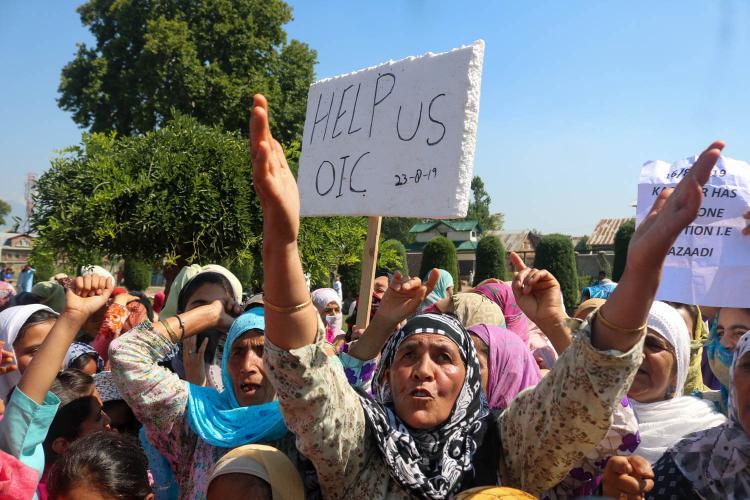
People protest at Soura in August against the abrogation of Article 370. The area was termed as the bastion of post-abrogation protests as it witnessed massive rallies following the move.
The attacks began on October 14 when suspected militants carried out an attack in South Kashmir’s Sheermal village of Shopian, killing a truck driver Sharif Khan from Rajasthan. Since then, more attacks were carried out against non-locals working in Kashmir including apple traders, labourers and truck drivers. The attack came after the government in October issued an advisory calling for the return of the tourists to the Valley. In August, just ahead of the abrogation, the government had issued an advisory directing all tourists to leave the valley immediately following which a massive clampdown was enforced.
Also watch: Truth of Kashmir, Lies of Kashmir
The abrogation of Article 370 reignited the quibble between India and Pakistan as the latter invoked the issue at various global meets including at the UN General Assembly. For the first time, China openly jumped into the fray terming the move as an “act of aggression”. China raked the issue at a closed door meet in the UN security council meet, first time in decades. Many observers saw the revocation of 370 as an alteration in the internal status-quo of the conflict-ridden region with the dismantling of social and political dimensions.
The cross border skirmishes on the Line of Control (LoC) are at decade high and continue to occur at a higher rate. On October 24, dozens of shells exploded for the first time in the Reddi village, which is around 70 km from the LoC.
For 2020, reports of a new political dispensation to enter the political circle of the newly formed UT are already rife. Much of the fatigue or a semblance of normalcy seems to have already set in as the new year is about to start but, for people, fears of a possible demographic change, escalation of conflict, heightened insurgency and counter-insurgency and hence, a repeat of cycle of violence already looms large. The silence after months of siege is deafening. Even as many believe the status quo has been tinkered how the change sets is yet to be witnessed.
Even though, J&K is now a UT with assembly, the polls are yet to be held and a delimitation process to be carried out. "Election will come. It is a union territory with a legislature, it will not continue like this (LG's rule)," the governor had said earlier in November.
For now the people in the region are awaiting a complete restoration of communication services, especially internet.
Also read: Is Development Really an Answer to Conflict in J&K
Get the latest reports & analysis with people's perspective on Protests, movements & deep analytical videos, discussions of the current affairs in your Telegram app. Subscribe to NewsClick's Telegram channel & get Real-Time updates on stories, as they get published on our website.









